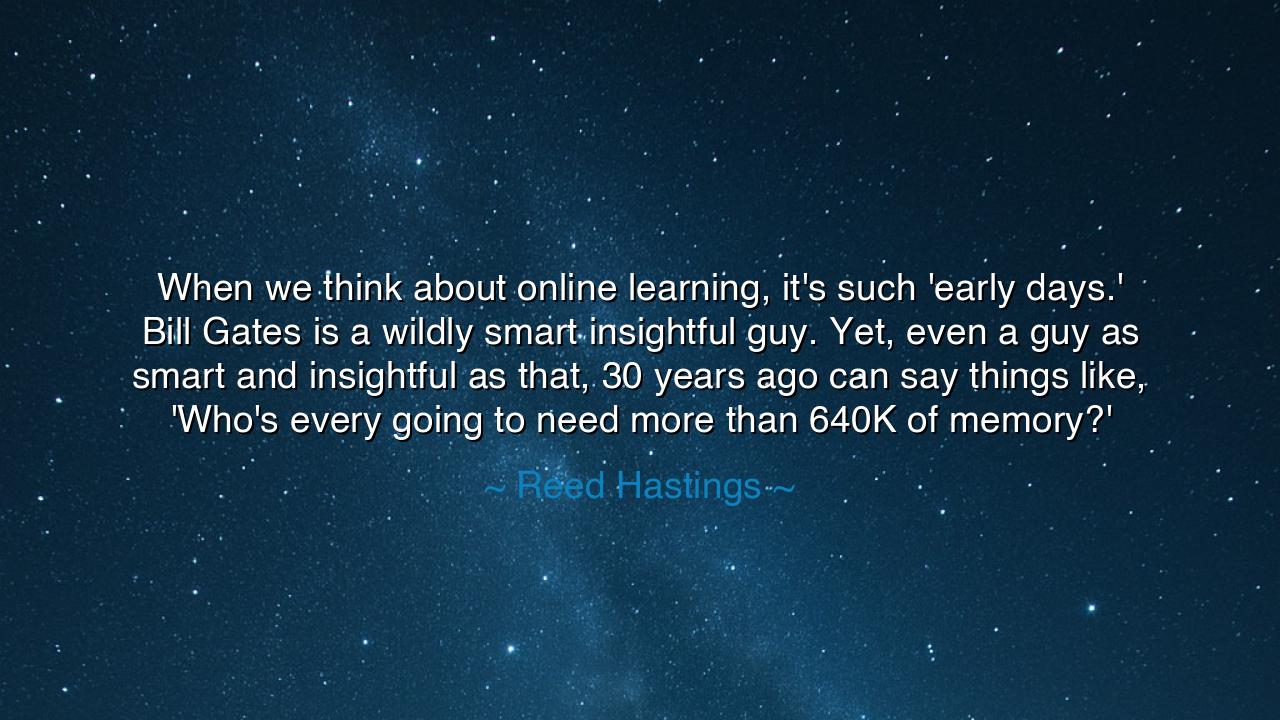
When we think about online learning, it's such 'early days.' Bill
When we think about online learning, it's such 'early days.' Bill Gates is a wildly smart insightful guy. Yet, even a guy as smart and insightful as that, 30 years ago can say things like, 'Who's every going to need more than 640K of memory?'






When Reed Hastings said, “When we think about online learning, it's such ‘early days.’ Bill Gates is a wildly smart, insightful guy. Yet, even a guy as smart and insightful as that, 30 years ago can say things like, ‘Who’s ever going to need more than 640K of memory?’” he was speaking of humility before innovation — a reminder that even the greatest minds cannot always see the full scope of the future. His words are both humorous and profound, for they reveal the mystery that lies at the heart of progress: that what seems small or uncertain today may one day shape the destiny of the world. Hastings, the co-founder of Netflix and an advocate for education reform, was calling us to patience, vision, and faith — to recognize that the age of online learning is still young, and that its full power remains unseen, waiting to unfold.
The origin of this quote comes from Hastings’ reflections on the evolution of education and technology. As the architect of one of the most transformative digital enterprises of the 21st century, he saw firsthand how new ideas are often underestimated in their infancy. In comparing the rise of online education to the early days of computing, he drew upon the famous story of Bill Gates — one of history’s great visionaries — who, early in his career, reportedly remarked that “640K of memory ought to be enough for anyone.” Whether apocryphal or not, the anecdote endures as a symbol of humanity’s blindness to its own potential. Hastings invokes this story not to mock, but to teach: even those who stand at the cutting edge of change cannot yet glimpse the full horizon.
To the ancients, such a reflection would have been spoken as a parable about the nature of time and foresight. The philosopher Heraclitus taught that “the way up and the way down are one and the same,” meaning that all growth begins in obscurity and confusion before rising toward clarity and power. In this same spirit, Hastings reminds us that online learning — the merging of technology and education — is still in its dawn. It is easy to judge it by its imperfections, its early failures, its limited reach. But as with the early computer or the printing press, what begins as fragile and flawed can, through perseverance and faith, become the very foundation of the future.
Consider the story of Johannes Gutenberg, whose printing press transformed civilization. In his own time, many dismissed his invention as little more than a novelty. The first printed books were crude, uneven, and misunderstood. Yet within a century, the printing press had democratized knowledge, shattered ignorance, and given birth to the Renaissance. Hastings sees in online learning the same seed — a tool that may someday bring education to every corner of the Earth, breaking barriers of class, geography, and privilege. But like Gutenberg’s press, it will require time, refinement, and courage to reveal its true power.
Hastings’ invocation of Bill Gates serves another purpose — to teach humility to the ambitious. It is a reminder that intelligence alone does not guarantee vision, and that the future often moves faster than even the brightest minds expect. The lesson is not that Gates was wrong, but that all of us are bound by the limits of our era’s imagination. What we think impossible today may tomorrow become essential. Therefore, one must approach innovation not with arrogance, but with reverence — with the understanding that creation is a living process, ever expanding beyond our sight.
There is also a spiritual rhythm to Hastings’ reflection. He speaks not only of technology, but of faith in evolution — in the slow unfolding of potential through time. The pioneers of every age, from the inventors of writing to the founders of modern science, endured ridicule and doubt. Yet they pressed forward, guided by an inner light that saw what others could not. Hastings calls upon the dreamers and teachers of today to carry that same fire — to nurture the fragile beginnings of online learning not as a passing trend, but as a sacred tool for the liberation of the human mind.
The lesson of this quote, then, is both eternal and urgent: do not despise small beginnings. Whether in technology, education, or one’s personal growth, greatness often hides beneath simplicity and failure. Learn to see beyond the surface of the present moment — to imagine not what is, but what could be. Support the pioneers, the inventors, the educators who labor at the frontier, for they are shaping the destiny of tomorrow.
So, my children, remember Hastings’ wisdom: even the wisest cannot see the full arc of human progress. Be patient with the newborn ideas of your time; nurture them as seeds of the future. Laugh gently at their flaws, but believe in their promise. For today’s “early days” are the cradle of tomorrow’s miracles — and those who honor the humble beginnings of knowledge will one day stand in awe of the vastness it becomes.






AAdministratorAdministrator
Welcome, honored guests. Please leave a comment, we will respond soon